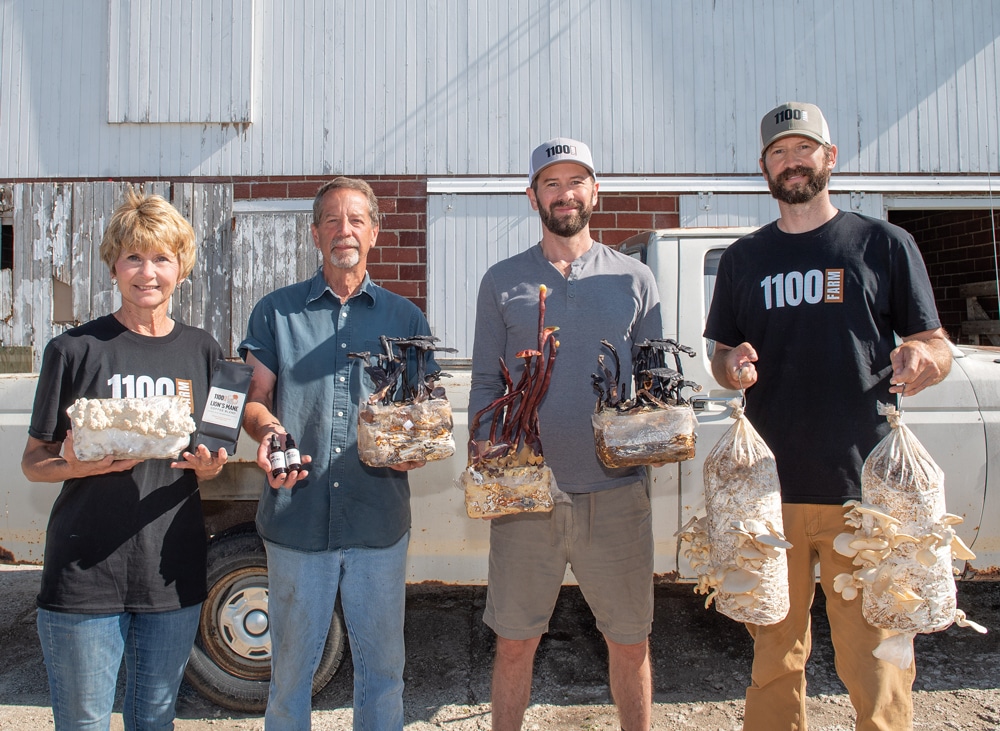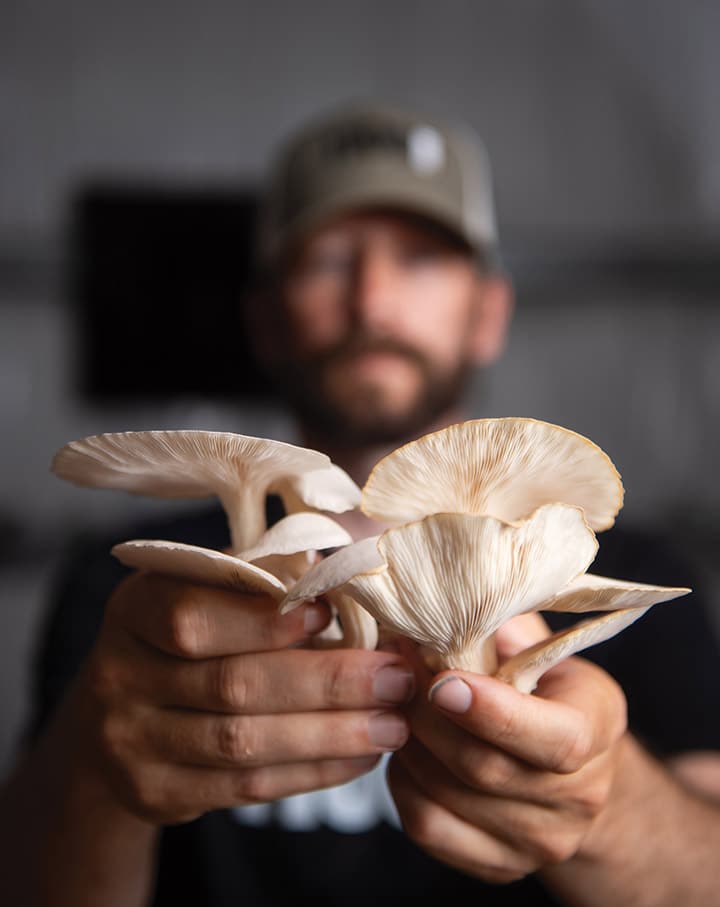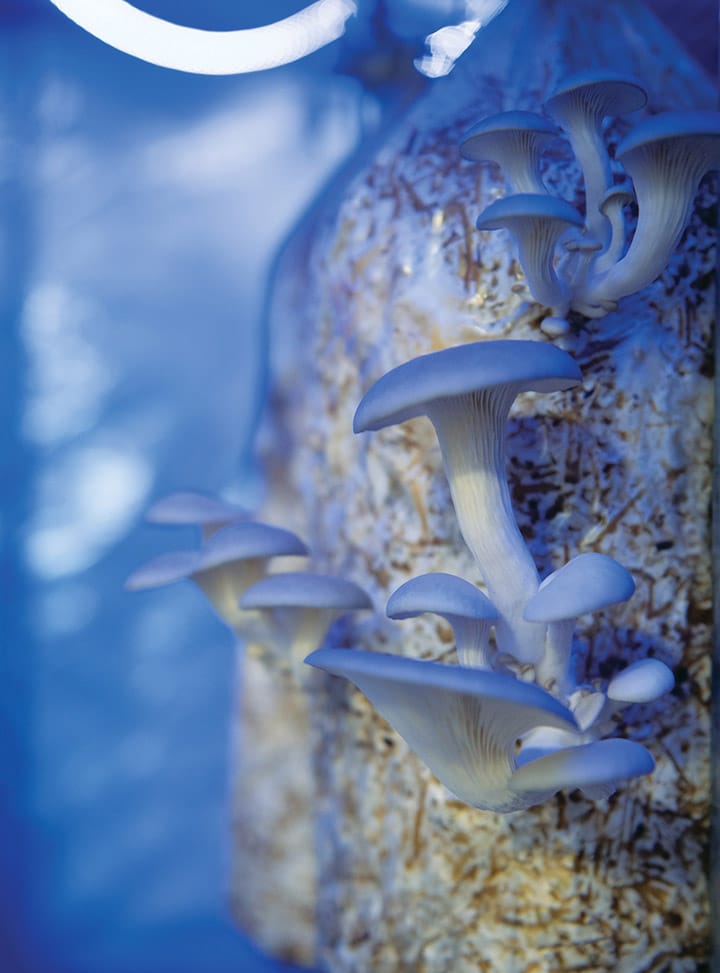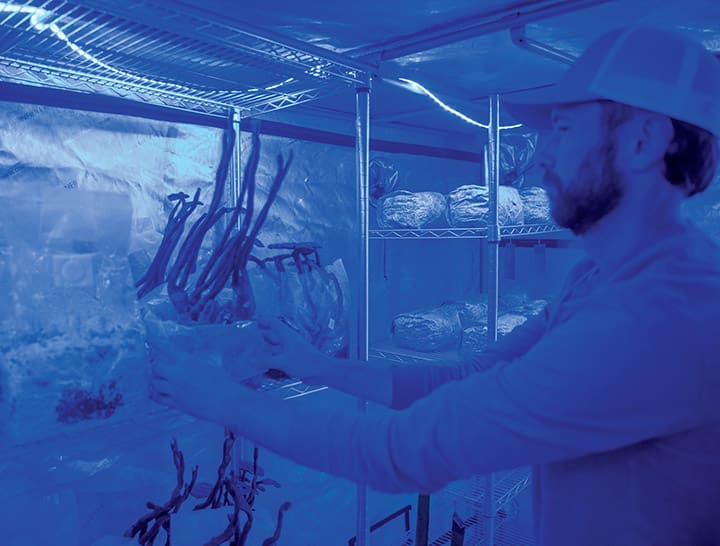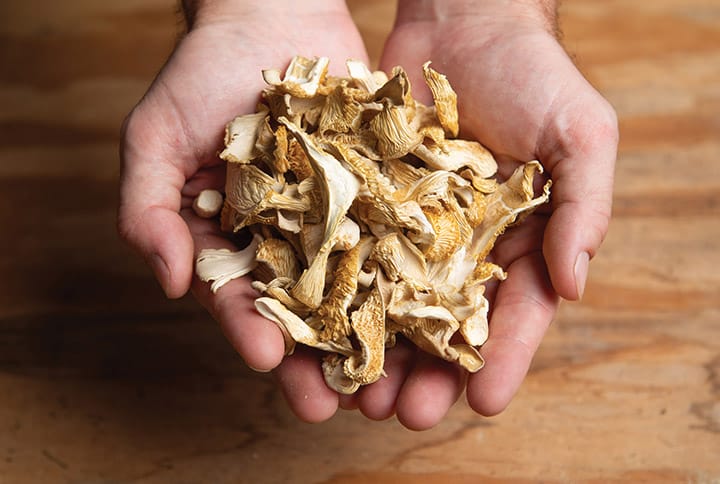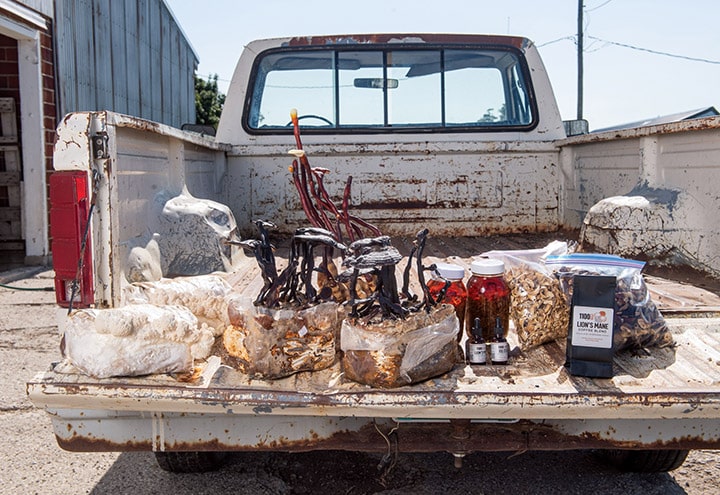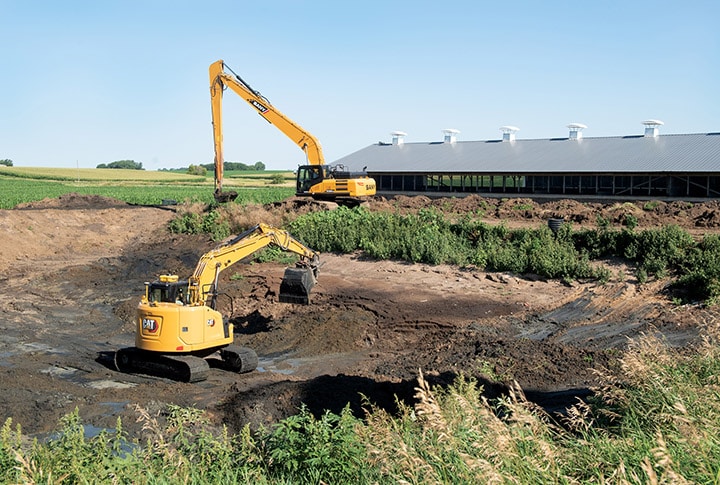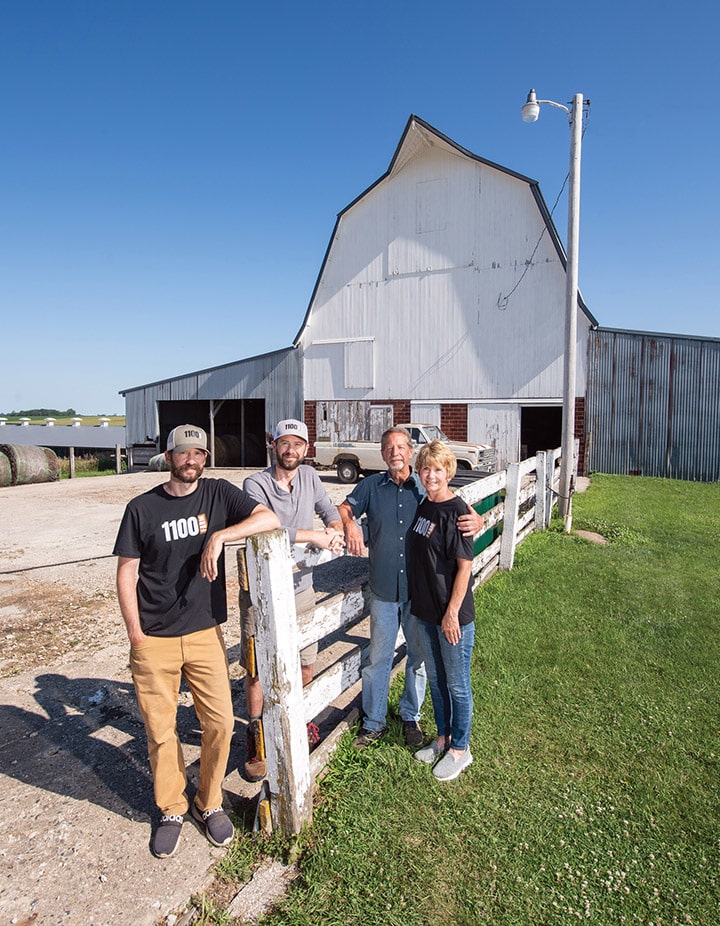A farm transformation
Faaborg family transitions pig-farming operation to mushroom business

Kyle Heim Aug 9, 2024 | 6:00 am
16 min read time
3,721 wordsAg and Environment, All Latest News, Business Record Insider, Innovation and EntrepreneurshipAfter becoming one of the early adopters of a farming practice that would forever change animal agriculture, the Faaborg family in Radcliffe is swapping its concentrated animal feeding operation for mushrooms.
Today, their property is known as the 1100 Farm, a nod to how Tanner Faaborg’s stroke of reimagination is helping preserve his family’s farm.
“The buildings were actually called Murphy 1100 buildings,” Tanner said, pointing to two pig barns that used to house 1,100 pigs each. “And they were some of the first CAFOs in existence. I wanted to take back that name, and then use it as a way to always remember that change is possible, even though difficult at times.”
The Environmental Protection Agency defines animal feeding operations as livestock operations where animals are confined for at least 45 days in a 12-month period and don’t have access to grass or other vegetation during the normal growing season. A concentrated animal feeding operation then has to meet a threshold for the number of animals confined in that space.
The thresholds for large CAFOs, medium CAFOs and small CAFOs are based on the type of animal. For pigs weighing over 55 pounds, 2,500 or more would be considered a large CAFO, 750 to 2,499 a medium CAFO, and fewer than 750 a small CAFO.
The definitions, however, do not include measurements of the size of the operation that the animals are held in.
“CAFOs are a means to decrease the footprint required to raise and maintain animals, thereby increasing the total production per acre,” according to the U.S. Department of Agriculture.
An Environmental Working Group study found that large CAFOs in Iowa swelled from 789 in 1990 to 3,963 in 2019.
“The 68 billion pounds of manure produced annually by Iowa’s large CAFOs are typically spread, untreated, over agricultural fields,” according to the study. “Once the manure is spread on fields, the nitrogen, phosphorus and bacteria it contains can seep into groundwater or run off to contaminate lakes and streams.”
By the end of 2024, the former pig buildings at 1100 Farm are expected to house a mushroom operation that Tanner hopes will produce about 4,000 pounds of mushrooms weekly, with varieties ranging from reishi to lion’s mane to Tanner’s favorite, blue oyster.
For Tammy Faaborg, seeing her son’s forward-looking approach materialize on the same property where she and her husband, Rand, started a CAFO over three decades earlier, conjures up memories of those early years on the farm.
“It’s kind of like the same thing as when we started with the pigs,” Tammy said. “That was completely new in this area. I mean, it’s saturated now, and it’s way too saturated. But when we started, we were the first [CAFO in the area] and so that was kind of scary, but we were younger. I think now, it’s just kind of gone full circle. And now we’re trying something new that’s better for the earth, and I am learning about mushrooms. I had never actually even fixed a mushroom before we started.”
Building the CAFOs
When Tanner was about 8 years old, over 1,000 miles across the country, Wendell Murphy, a former farmer and North Carolina politician, was expanding his Murphy Family Farms company into Iowa.
He invited Tammy and Rand to become contract farmers, offering to help with the loan, construction and planning for a new CAFO on their land.
“The deal sounded pretty sweet,” Tanner said. “I think it sounded good to [my parents], and they would pay off the loan in 10 years and after that be making good money.”
For Tammy and Rand, the offer provided a potential retirement plan and the ability to help send their seven kids to college.
They had purchased the first piece of the farm only a few years earlier, in 1986, and moved to the farmstead with four kids and a push lawnmower.
“The kids did not want to go out of the yard because we had lived in town, a small town, and they didn’t really understand that they could go farther than just the front yard,” Tammy said. “I said, ‘This is all ours, you can go,’ but they would just kind of stay in the yard because they were afraid to go out. I said, ‘You can go explore.’”
That changed quickly, Tanner reminds his mom. “And then we were roaming.”
“And then it was like, ‘No, don’t go down to the creek without a mom or dad,’” Tammy said. “Let’s not jump into the creek.”
As the kids grew, and a few more joined the family, they got more involved with the pig operation.
“Even before I knew anything about sustainability or environmental impacts, I just did not like pig chores,” Tanner said. “It was not fun, but it did pay well. That was one of the jobs you could have when you were a kid … going to other pig farms and loading pigs in the middle of the night and making some extra money.”
‘Never quite what it was promised’
While the operation continued for over three decades, multiple reinvestments in the buildings to maintain the contract dimmed the once-promising financial outlook.
“I think my parents were expecting it to go one way, but then there’d always be something that would come up,” Tanner said. “So, the money was never quite what it was promised, and then eventually us kids graduated high school and moved out, went to college. Then, my parents were kind of on their own with the pig farming, and I think that’s when they started thinking, ‘Well, I don’t know how much longer we want to do this.’ But they did need the money, and it was a big investment into those barns, so they continued on for a while.”
While his parents kept the operation running, Tanner studied English literature and political science at the University of Iowa before a passion for travel sent him around the world.
He estimates in three years he visited about 65 countries spanning six continents.
“That’s when I got my gray hair,” Tammy said.
Upon returning to Iowa, Tanner moved to Des Moines and led the nonprofit Urban Ambassadors, working on sustainability initiatives in Iowa’s capital.
“It was exciting,” Tanner said. “We were making a lot of progress. I felt like we were doing a lot of good things, but I realized that the family farm, and agriculture in general, was a big contributor to climate change and negative environmental impacts. And I wanted to do something about it.”
At the same time, Tammy and Rand wanted out of pig farming.
“That’s when I started thinking, ‘Well, what if we retrofit these buildings and come up with an alternative?’” Tanner said. “And they seemed to be on board with that, so I started looking into it. It was a bit of an intimidating process, just going it alone, looking at different alternatives, trying to work and do other things at the same time.”
Partnering with Transfarmation
The idea gained traction when Tanner discovered Transfarmation, a nonprofit in Los Angeles that helps factory farms transition from industrial animal agriculture to production of specialty crops.
The Transfarmation team lists eight farmers on its website that it’s been working with, all in various stages of transitioning, from ceasing factory farming to starting new sustainable plant operations.
The Halley family in Texas transitioned from raising chickens to growing hemp and rescuing homeless animals.
Mike Lanigan and Edith Barabash in Ontario turned their cattle ranch into a vegetable farm, growing leafy greens, beans, peas and roots.
A former poultry farm in North Carolina run by Paula and Dale Boles is now home to greenhouses for microgreens, hemp, flowers and specialty vegetables.
“It’s less about the number of farms that we’ve worked with and more about the work that has been produced through working with those farms,” said Tyler Whitley, director of Transfarmation. “Our goal isn’t to individually work with a lot of individual farms. Our goal is to work with a small cohort of farms, so that we can create resources, models, guides that many farmers can independently implement.”
The Transfarmation team provides a three-step process for farmers interested in transitioning to specialty crop-focused operations: initial contact, farmer assessment and a transition plan.
During the first step, the team invites interested farmers to fill out a farmer interest form, assessing whether it is a good fit for the farmer.
Questions the team asks include:
Can we help meet the farmer’s current needs?
Do we have the capacity to enroll another farmer?
What is the farmer’s opinion of industrial animal agriculture?
Does the farmer align ideologically with our work?
If they decide to work together, a pair of assessments are taken to better understand the farmer and their situation, as well as identify their most pressing needs. The team also assesses the infrastructure and assets available on the existing farm and their potential to be repurposed.
In the final step, the Transfarmation team works with the farmer on building a transition plan. The plan includes “compiling farmer resources and educational materials, providing the farmer with one-on-one training on a new crop, drafting a business plan assisting the farmer in identifying and securing buyers for their new product and offering guidance on infrastructure changes,” according to the Transfarmation website.
The team focuses on repurposing existing infrastructure and transforming former industrial animal facilities, as well as identifying grant opportunities for farmers.
“They set me up with some consultants, and we started looking at different business models and what we could do,” Tanner said. “That’s when I discovered mushrooms.”
Down the rabbit hole
Despite almost no knowledge of mushrooms and very little prior exposure to them, Tanner gained an appreciation for the health benefits and versatility of the fungi. They would allow the family to experiment with a variety of different products, including the tinctures, coffees, seasonings and fresh produce.
Tanner shared with his parents the idea of converting the family’s pig operation into a mushroom business.
“He’s crazy,” Tammy thought of her son’s initial proposal.
From there, Tanner said he “went down a rabbit hole” researching mushrooms.
“And he’s still there; he hasn’t climbed out,” Tammy said. “Send him a rope. Send him a rope and pull him out.”
About a year after he was first introduced to Transfarmation, Tanner secured enough funding to help with the conversion of the barns and the creation of a demonstration hub on the farm “to kind of set an example for what’s possible within the agricultural system and just the changes that could take place to create a more diversified food and localized food system in a sustainable way,” he said.
Tammy and Rand slowly began warming up to the idea.
“They were a little hesitant at first, to say the least, because it’s a big change after 30 years of pig farming,” Tanner said. “To do something completely different can be very intimidating. So, we got to a point where my parents felt comfortable with it, and I had enough funding where I could invest the necessary financing into the retrofit of the buildings. My parents ended their 30-plus-year contract, and the last of the pigs went out. And now the barns are empty.”
The planning is complete, the blueprints are drawn and construction is underway.
“Now instead of 2,200 pigs, once we’re at 100% capacity, we’ll be able to harvest around 4,000 pounds of mushrooms a week inside the pig barns,” Tanner said. “I believe we’ll be the largest specialty mushroom farm in Iowa and one of the largest in the Midwest.”
In the meantime, the Faaborg family has started a smaller operation inside an insulated shop on the property.
“We built the insulated shop ourselves,” Tanner said. “My brother [Tyler] and I were doing some metal fabrication. We had a small metal fabrication business, but we had plenty of extra space in here. So, we thought this would be perfect to get our feet wet and to learn about mushroom farming through mushroom farming, through doing it on a smaller scale.”
Tyler joined his brother’s new business venture after spending nearly his entire life in pig operations.
While working with Iowa Select out of high school, Tyler began managing different sites and became responsible for about 50,000 pigs stretching across five counties, Tanner said. As a result, Tyler was working about 80 to 90 hours a week with no vacations and no days off.
“And he did that for about 20 years,” Tanner said. “My parents and my brother are workaholics. My brother is one of the hardest workers I know.”
Now the four are all working together again, starting with the production of lion’s mane and reishi tinctures, both of which are available on 1100farm.com.
The lion’s mane tincture, intended to be taken in the morning, is designed to provide brain health, mental focus, anti-inflammation and immune system benefits, according to a label on the bottles. The reishi tincture, intended to be taken in the evening, is designed to provide anti-anxiety, heart health, mood boost and restful sleep benefits.
Tanner also has partnered with Coffalo Coffee in West Des Moines on a lion’s mane mushroom coffee.
“We’re excited to go live pretty soon [with the coffee]; right now, we’re accepting preorders,” he said. “We’ll go live with those sales fairly soon. And we’re in the process of starting mushroom salt and other mushroom seasonings. So, that’s it right now. But this process is just a lot to learn. It’s definitely a lot of work; we have a small team. There are a lot of new products I want to launch right now, but there are only so many hours in the day, and there’s only so much funding that we have.”
Tanner expects to have the products in farmers markets and community-supported agriculture programs by next year.
“Another mission of ours is to create a more localized food system,” he said. “So, I’ll be looking at every avenue possible to get our fresh oysters and our fresh lion’s mane out there for people to eat.
“There’s also interest from Hy-Vee and some other bigger grocery stores and retailers. But first I want to make sure that we have enough quantity to fill those orders. I know there’ve been a couple of universities that have been very interested and others who are interested in the fresh produce. But they want pretty high volume and at a consistent basis, so I just want to make sure we’re able to fill those orders before we take them.”
The growth of small farms and a need for marketing skills
Iowa State University economist Chad Hart said one of the keys to surviving as a specialty crop producer is the ability to successfully market those products, a somewhat unique, yet increasingly important, skill within agriculture as Iowa witnesses a spike in small farms.
Farms of fewer than 180 acres have increased nearly 12% over the past two decades, according to the latest Census of Agriculture, which is a comprehensive farm survey that the USDA conducts every five years.
“I think [marketing] is a growing skill that really hadn’t been needed in agriculture over the past, you could argue, a couple of centuries,” Hart said. “If you were growing corn, soybeans, wheat, you didn’t have to worry about basically selling your crop or creating that market. It was always there. In this case with mushrooms here, I’m going to assume that they had to go out and find those customers. Who are you selling to? Make those connections. I’m going to guess that they spend just as much time marketing as they have on the production side, which is different than what we traditionally see within agriculture.”
Farms with 2,000 or more acres also are on the rise in Iowa, increasing 77% from 2002 to 2022, according to the USDA census data. The losses are happening to the midsized farms, between 180 and 1,999 acres, which have shrunk by nearly 23%.
Overall, Iowa had 86,911 farms in 2022, 3,744 fewer than in 2002.
Sally Worley, executive director of Practical Farmers of Iowa, said she believes small farms are critical to the survival of rural communities in the state.
“In 1950, for example, there were about 205,000 farms in Iowa,” Worley said. “And in 2021, we had just under 85,000, so quite a cut. And over that time, we’ve seen a decrease in the diversity of crops people are growing, as well as a decrease in the amount of money going directly to the farmers, which has led to a big decrease in the economic vitality of rural communities.
“Without the small and medium farms prevalent across Iowa, most of our rural communities are shrinking. They’re consolidating schools, they’re losing their local businesses, so the revitalization of these small farms is very necessary for our state. And then going further, the revitalization of the midsized farms is also desperately needed for the vitality of our state, and not just economic, but environmental, social, the whole gamut.”
Tanner hopes the mushroom operation at his family’s farm will serve as a catalyst for change and an investment in the rural community.
“When you think about the case of what you’re seeing there in Radcliffe with this farm transitioning to mushrooms, there’s what you call a success story, where the farm continues on,” Hart said. “It’s in a different form, but they moved that farm forward and kept that economic activity local. If the land is transitioning into those smaller farms, that tends to be an economic win for the local rural community.”
Still, Worley noted there’s a steep hill for small farmers to climb to be successful.
“They are kind of on their own for the infrastructure, the market, insurance, all of those things, and they aren’t getting a lot of support to do that,” she said. “So, it’s a lot, which is why we don’t see as many as we should, but there’s a very savvy group out there. I won’t say it’s easy, because it’s definitely not, but they are having some success. … This new generation of farmers coming in is really highly motivated to sustain and grow food for their communities. It’s good to see that trend. They are having successes, but it’s not an easy road to be successful.”
Another obstacle for farmers growing specialty crops is they can only get so big before the cost of production outweighs profits.
Meanwhile, commodity farmers benefit from economies of scale, meaning the more they grow a crop or commodity, the lower the cost of production becomes, and the more competitive the farmer can be.
“When we’re looking at our small farms and looking at those specialty crops, those don’t tend to have those same economies of scale,” Hart said. “And in fact, what you often see is they have a certain size limitation that once you get big enough beyond a certain point, it actually costs you more to produce. Those goods that you can create on those small farms tend to be high-valued, but they also tend to be of a certain scale that if you got bigger, it would actually hurt your business as opposed to help it. And so that’s oftentimes what we see here, especially when you’re looking at crops like fruits and vegetables.”
While Hart had not seen any other farms in Iowa transitioning to mushrooms, he noted that some pig farms in Iowa have converted into some type of vegetable or herb operation.
“I’m glad to see that [the Faaborgs] are making that transition,” Hart said. “It’s always interesting to look and see how people reposition farms. Like in this case, I had never thought about mushrooms, but it does sort of make sense in that you think about those hog facilities, those buildings that we create to hold the animals, yeah, they can be repurposed for other areas. And, yeah, mushrooms make a lot of sense as long as you can find the market to sell them into.”
A commitment to conservation
The renovation of the pig barns isn’t the only project in the works on the 1100 Farm.
The Faaborgs are planting about 700 trees along the creek for a riparian buffer strip, starting an oxbow restoration and converting their open-pit lagoon previously used for waste into a freshwater pond.
“There are a lot of conservation and rewilding efforts that are also taking place that are part of that contract [with Transfarmation],” Tanner said. “A lot of things we’re doing aren’t moneymakers, but just to kind of do the right thing and to set an example. And I really enjoy that aspect of it and that work.”
Tanner hopes this venture will set an example that transitioning from commodity farming to specialty crops not only can be successful but benefit the community and the environment.
“The potential is there,” he said “The infrastructure is there. There are a lot of people in the same situation as my family, where you have investments in these buildings, you have the infrastructure, and just with a few tweaks and a few renovations, you could be doing something else and creating more jobs, creating more opportunities, localizing the food system, having an impact on health and wellness. Feel good about what you’re doing and take pride in what you’re doing.”

Kyle Heim
Kyle Heim is a staff writer and copy editor at Business Record. He covers health and wellness, ag and environment and Iowa Stops Hunger.

